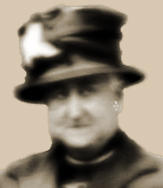Lady Bracknell does not consider herself to be overly parsimonious, but neither does she see any intrinsic merit in paying the full retail asking price for something she wants when that same object is available more cheaply elsewhere in return for only a very little effort on her part.
It is this metaphorical nose for a bargain which has led her ladyship - via the computing skills of her editor - to make so much use of eBay, the online auction site.
There are some people who are nervous of eBay, and others who have wasted large sums of money on it. If you are an inveterate impulse buyer; or if your self-control is such that you can not trust yourself to stop bidding when you have exceeded the price you are willing to pay for the object of your desire; or if your competitive spirit prevents you from backing down in a bidding war, then eBay is probably not for you.
If, on the other hand, you were once a practised afficionado of the charity shop and the jumble sale, but are no longer sufficiently physically robust to enjoy such pursuits, then eBay should serve very well as an online substitute.
There are many comprehensive guides available to making optimum use of eBay, and Lady Bracknell has neither the time nor the desire to replicate them here. She will, however, enumerate some of the tricks she and her editor have learned over the years in the hopes that these will prove useful to her readers.
Do your homework. By no means everything which is held out for sale on eBay is cheaper there than it is elsewhere. Comparison shopping is, if anything, even
more important on the Interwebnet than it is on the high street. Electronic items, in particular, are often listed at a higher price on eBay than that for which they could be purchased in a real shop. (Pray do not ask how Lady Bracknell knows this: she has her sources, and they are reliable.)
Check the shipping costs. There are a small minority of sellers who use shipping charges to bump up the profit they make on an item. If you are happy that the final bid price plus the shipping fees still represents good value for money, then all is well. But check before you bid. If you receive negative feedback as a result of reneging on a deal because you have realised too late that the shipping charges are extortionate, you will find that other sellers may well be unwilling to do business with you.
Set up "favourite searches". If you are looking for something specific which is not listed by the dozen every hour, consider setting up a favourite search. eBay will send you an electronic communication every time an item meeting the description in your search term is listed. Then you simply save the item to your watching list and wait for the auction to draw to a close.
Beware spelling errors. By no means all the people who list items for auction have perfect spelling. Lady Bracknell's editor searches daily for items produced by Thierry Mugler. It did not take her long to reduce her search term from "Thierry Mugler" to "Mugler". "Thierry" is clearly too difficult a name for many sellers to spell, and searching under the correct spelling excludes items spelled incorrectly from the list with which you will be supplied.
Don't bid the price up! Whenever possible, refrain from bidding until the last possible moment. (The exact timing of the last possible moment will depend on the speed of your Interwebnet connection and the steeliness of your nerve. Make sure you are signed in in plenty of time. Nothing makes the heart beat faster than placing a bid in the last 30 seconds before an auction ends only to be faced with a screen asking you to sign in.) Bid early, and you leave time for other interested parties to bid after you, thus raising the final price of the item. Decide what the maximum price you are willing to pay for the item in question is, and bid that amount in full as late as you dare. There will not be time for you to increase your bid by tentative increments of 50p if it transpires that someone else is bidding against you at the last moment. If luck is on your side, you will still win the item for less than your maximum bid. If not, you will be outbid. But you will at least have the satisfaction of knowing that you were not tempted to exceed your maximum.
Read the item description carefully. Horror stories abound, such as that of the gullible bidder who paid large sums of money for the cardboard box in which an X-box console had been sold. The item listing didn't actually contain any outright falsehoods, but it was constructed to give the impression that the console itself was being auctioned. ("Console" may be the wrong word, here: neither Lady Bracknell nor her editor has had any first hand experience of this type of device.)
Check feedback. The feedback system is one of eBay's great strengths. Nobody - sellers in particular - wants to have negative feedback on their record for all to see. Be suitably wary of sellers who either have multiple negative feedbacks or whose profile pages show that they have changed their selling identities. (Lady Bracknell should add at this point that the overwhelming majority of sellers with whom she has had transactions have been absolutely charming. Nevertheless, there
are some unscrupulous people out there and it is wise to do what one can to avoid coming into contact with any of them.)
Don't be xenophobic. For the best bargains, don't feel you must restrict your searches to UK sellers. Lady Bracknell regularly buys items from the US. She has also bought from sellers in Lithuania, Greece, France, Germany and Australia. You will often find that post arrives more quickly from the US than from other parts of the UK.
Poor photographs can be your friend. This may sound odd, but Lady Bracknell will explain. Some sellers are very skilled at posting slick, professional, eye-catching item listings complete with multiple crystal-clear photographs. Others are not.

Above is one of the photographs which appeared in the listing for an auction which Lady Bracknell won on Wednesday. It is a mediocre photograph, and is thus not appealing to the casual browser. This is, however, a pair of Jean Lafont spectacle frames. Their recommended retail price is in the region of £200. The starting price for the auction was under £22. This appeared to Lady Bracknell to have the potential for being a very good deal, so she asked her editor to search for a better picture. And
here it is. (The colour is 504.)
Lady Bracknell is pleased to report that she was the
only bidder and that, even taking into account postage from the US, she has paid less than £33 for these frames. Of course, it may be the case that no other eBay user was interested. On the other hand, it seems more likely that it was the layout of the listing which failed to attract bidders. All the necessary information - model number, colour reference, and frame measurements – was contained in the listing, albeit with spelling errors and in a rather unattractive font. But a little time spent searching on Google was all that was required for Lady Bracknell to satisfy herself that this was a pair of spectacles she would be happy to add to her collection.
NB. If, like Lady Bracknell, you buy spectacle frames either on eBay or from other Interwebnet purveyors, it is important to have a warm relationship with your dispensing optician should you wish to have the frames glazed to your prescription. Marmite Boy had an
unfortunate experience in this regard.












